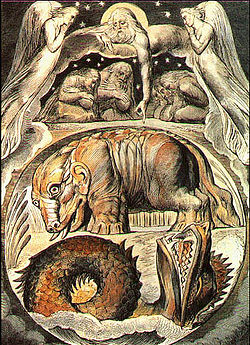
Further to Joe’s point about Robert Alter:
Another cheap shot by Alter is his critique of Frye’s interpretation of Leviathan in Jonah and Job. Alter picks up a phrase here and there from Frye’s Great Code discussion, but he’s not in the least fair to Frye’s extended account of the way this image functions across the biblical narrative. One of the advantages of looking at the Bible as a unity is that it permits Frye to link the images of the Leviathan as they appear in Psalms 74 and 104, Isaiah 27 and elsewhere (the word occurs six times in the Old Testament). Alter says that the “Leviathan is in no way a force contending with God.” But it is clearly such a chaotic force in Psalm 74, where God is said to have crushed the heads of this marine creature, and in Isaiah 27, we’re told that the lord will punish the fleeing, twisting serpent and will kill the sea dragon. The image was a familiar one in Hebrew culture, as it was in Ugaritic poems. Alter, who has no sense of what a mythical symbol is, wants to make Leviathan into a literal crocodile rather than a symbolic primeval monster, a creature quite like the Behemoth of Job 40, also a symbol of chaos and evil. Alter says that the author of the Book of Job “never so much alludes to the belly of the beast.” True, the Hebrew poet doesn’t allude to the belly; he refers to it directly: “Look at Behemoth . . . its power in the muscles of its belly” (Job 40:15, 16). One would think that the literal minded Alter would at least pay attention to the letter. What we can say for Frye’s reading of the sea monsters––and their link with Rahab––is that he’s got biblical scholarship, which sees the sea monsters as symbolizing chaos and evil, on his side.
